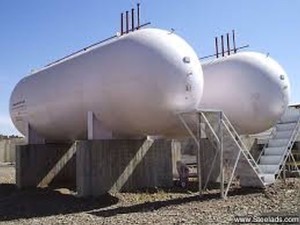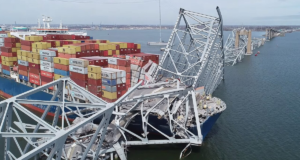Potential hazards of ammonia lack the visceral resonance with the reader that stories containing allegations of direct abuse are capable of generating.
 Haifa Bay, February 19 – Journalists and news agencies covering the Israeli domestic scene have struggled in recent weeks to come up with a direct relationship between the public outcry over the dangers involved in storing or moving ammonia and Israel’s treatment of Palestinians.
Haifa Bay, February 19 – Journalists and news agencies covering the Israeli domestic scene have struggled in recent weeks to come up with a direct relationship between the public outcry over the dangers involved in storing or moving ammonia and Israel’s treatment of Palestinians.
A sprawling tank farm sits on the coastline at Haifa, where the toxic chemical is stored for important industrial and agricultural purposes. Ammonia’s toxicity makes it dangerous above certain atmospheric concentrations, prompting Haifa-area residents to express concern over potential mishaps or terrorist attacks that would cause mass casualties. A spill of the chemical being transported by tanker truck last week added to the jitters. On the journalistic front, however, aside from noting the citizens’ complaints about living near such facilities, the best reporters have been able to do in terms of linking the story to the Occupation is to draw parallels between alleged official Israeli disregard for human life that characterizes both issues.
Luke Baker, head of the Foreign Press Association in Israel, and himself a Reuters correspondent, explained that the potential hazards of ammonia lack the visceral resonance with the reader that stories containing allegations of direct abuse are capable of generating. “Part of the problem is that environmental issues have limited appeal,” he observed. “That already handicaps the responsible journalists looking for an anti-Israel hook. But it goes beyond that. Israel’s ammonia facilities are just one part of an industrial economy that has precious little overlap with settlements, checkpoints, and the like. They’re all the way on the coast, away from the Green Line, and there’s nothing distinctive about employment practices that points to exploitation of Palestinian workers. So we haven’t hit upon a clear way to link the two issues, and we haven’t reported on the ammonia as a result.”
Al-Jazeera journalist Dibba Slandr elaborated. “There’s an unwritten rule among most journalists in Israel that everything has to be cast in terms of the conflict with the Palestinians,” he explained. “Even stories that aren’t really connected have to be presented at least with a mention of some aspect that invokes the conflict, or occupation, or just some way to paint Israel as uniquely unjust and barbaric. If we can’t find such an angle, even just to shoehorn it in, we deem it of no interest to our audience, and ignore it. I’m sure we’ll come up with something regarding the ammonia. If not, no biggie. We can always continue flogging the dead horse of Israeli human rights abuse through other reporting.”
Please support our work through Patreon.




